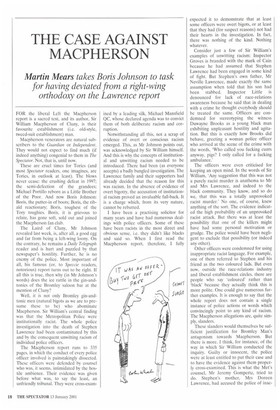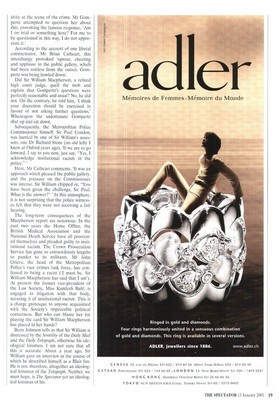THE CASE AGAINST MACPHERSON
Martin Mears takes Boris Johnson to task
for having deviated from a right-wing orthodoxy on the Lawrence report
FOR the liberal Left the Macpherson report is a sacred text, and its author, Sir William Macpherson of Cluny, is their favourite establishment (i.e. old-style, tweed-suit establishment) man.
Macpherson venerators are natural subscribers to the Guardian or Independent. They would not expect to find much (if indeed anything) congenial to them in The Spectator. Not, that is, until now.
These are cruel times for Tories (and most Spectator readers, one imagines, are Tories, in outlook at least). The blows never cease: the crushing defeat in 1997; the semi-defection of the grandees; Michael Portillo reborn as a Little Brother of the Poor. And now Boris Johnson: Boris, the putter-in of boots; Boris, the ribald reactionary; Boris, toughest of the Tory toughies. Boris, it is grievous to relate, has gone soft, sold out and joined the Macpherson fan club.
The Laird of Cluny, Mr Johnson revealed last week, is, after all, a good egg and far from being a left-wing loony. On the contrary, he remains a Daily Telegraph reader and is hurt and puzzled by that newspaper's hostility. Further, he is no enemy of the police. Most important of all, his famous (or, to Speccie readers, notorious) report turns out to be right. If all this is true, then why (in Mr Johnson's words) does the ice rattle in the gin-andtonics of the Bromley saloon bar at the mention of Cluny?
Well, it is not only Bromley gin-andtonic men (natural bigots as we are to presume these to be) who abominate Macpherson. Sir William's central finding was that the Metropolitan Police were institutionally racist. The whole police investigation into the death of Stephen Lawrence had been contaminated by this and by the consequent unwitting racism of individual police officers.
The Macpherson report runs to 335 pages, in which the conduct of every police officer involved is painstakingly dissected. These officers were defended by counsel who was, it seems, intimidated by the hostile ambience. Their evidence was given before what was, to say the least, an unfriendly tribunal. They were cross-exam ined by a leading silk, Michael Mansfield QC, whose declared agenda was to convict them of both deliberate racism and corruption.
Notwithstanding all this, not a scrap of evidence of overt or conscious racism emerged. This, as Mr Johnson points out, was acknowledged by Sir William himself. And this is why the concepts of institutional and unwitting racism needed to be introduced. There had been (as everyone accepts) a badly bungled investigation. The Lawrence family and their supporters had already decided that the reason for this was racism. In the absence of evidence of overt bigotry, the accusation of institution al racism proved an invaluable fall-back. It is a charge which, from its very nature, cannot be rebutted.
I have been a practising solicitor for many years and have had numerous dealings with police officers. Some of these have been racists in the most direct and obvious sense, i.e. they didn't like blacks and said so. When I first read the Macpherson report, therefore, I fully expected it to demonstrate that at least some officers were overt bigots, or at least that they had (for suspect reasons) not had their hearts in the investigation. In fact, there was nothing of the kind. Nothing whatever.
Consider just a few of Sir William's examples of unwitting racism: Inspector Groves is branded with the mark of Cain because he had assumed that Stephen Lawrence had been engaged in some kind of fight. But Stephen's own father, Mr Neville Lawrence, made exactly the same assumption when told that his son had been stabbed. Inspector Little is denounced for lack of race-relations awareness because he said that in dealing with a crime he thought everybody should be treated the same. Officers are condemned for stereotyping the witness Duwayne Brooks as a young black man exhibiting unpleasant hostility and agitation. But this is exactly how Brooks did behave, greeting a woman police officer who arrived at the scene of the crime with the words, 'Who called you fucking cunts anyway, pigs? I only called for a fucking ambulance.'
The officers were even criticised for keeping an open mind. In the words of Sir William, 'Any suggestion that this was not a purely racist murder is anathema to Mr and Mrs Lawrence, and indeed to the black community. They know, and so do we, that this was a totally unprovoked racist murder.' No one, of course, knew anything of the sort. The evidence indicated the high probability of an unprovoked racist attack. But there was at least the possibility that one of the killers might have had some personal motivation or grudge. The police would have been negligent to exclude that possibility (or indeed any other).
Other officers were condemned for using inappropriate racist language. For example, one of them referred to Stephen and his friend as the two coloured lads. But even now, outside the race-relations industry and liberal establishment circles, there are people who say 'coloured' rather than 'black' because they actually think this is more polite. One could give numerous further examples. It is enough to say that the whole report does not contain a single instance of police actions or words which convincingly point to any kind of racism. The Macpherson allegations are, quite simply, slanders.
These slanders would themselves be sufficient justification for Bromley Man's antagonism towards Macpherson. But there is more. I think, for instance, of the way in which Sir William conducted the inquiry. Guilty or innocent, the police were at least entitled to put their case and to have the evidence against them properly cross-examined. This is what the Met's counsel, Mr Jeremy Gompertz, tried to do. Stephen's mother, Mrs Doreen Lawrence, had accused the police of mac tivity at the scene of the crime. Mr Gompertz attempted to question her about this, provoking the famous response, 'Am I on trial or something here? For me to be questioned in this way, I do not appreciate it.'
According to the account of one liberal commentator, Mr Brian Cathcart, this interchange provoked 'uproar, cheering and applause in the public gallery, which had been restless from the outset. Gompertz was being howled down'.
Did Sir William Macpherson, a retired high court judge, quell the mob and explain that Gompertz's questions were perfectly reasonable and usual? No, he did not. On the contrary, he told him, 'I think your discretion should be exercised in favour of not asking further questions.' Whereupon the unfortunate Gompertz shut up and sat down.
Subsequently, the Metropolitan Police Commissioner himself, Sir Paul Condon, was harried by one of Sir William's assessors, one Dr Richard Stone (an old lefty I knew at Oxford years ago), 'If we are to go forward, I say to you now, just say, "Yes, I acknowledge institutional racism in the police." ' Here, Mr Cathcart comments, 'It was an approach which pleased the public gallery, and the pressure on the Commissioner was intense. Sir William chipped in, "You have been given the challenge, Sir Paul. What is the answer?" ' In this atmosphere, it is not surprising that the police witnesses felt that they were not receiving a fair hearing.
The long-term consequences of the Macpherson report are notorious. In the past two years the Home Office, the British Medical Association and the National Heath Service have all prostrated themselves and pleaded guilty to institutional racism. The Crown Prosecution Service has gone to extraordinary lengths to pander to its militants. Mr John Grieve, the head of the Metropolitan Police's race crimes task force, has confessed to being a racist ('I must be. Sir William Macpherson has said that I am.). At present the former vice-president of the Law Society, Miss Kamlesh Bahl, is engaged in litigation with that body, accusing it of institutional racism. This is a charge grotesque to anyone acquainted with the Society's impeccable political correctness. But who can blame her for playing the card Sir William Macpherson has placed in her hands?
Boris Johnson tells us that Sir William is distressed by the hostility of the Daily Mail and the Daily Telegraph, otherwise his ideological kinsmen. I am not sure that all this is accurate. About a year ago, Sir William gave an interview in the course of which he described himself as a Blair fan. He is not, therefore, altogether an ideological kinsman of the Telegraph. Neither, we must hope, is The Spectator yet an ideological kinsman of his.































































 Previous page
Previous page